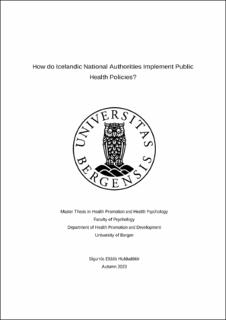How do Icelandic National Authorities Implement Public Health Policies?
Master thesis
Permanent lenke
https://hdl.handle.net/11250/3109655Utgivelsesdato
2023-11-20Metadata
Vis full innførselSamlinger
- Master theses [165]
Sammendrag
Island er et av de nordiske velferdstatene som er kjent for sine sjenerøse velferdstjenester, inntektsomfordeling og solidaritet. Som flere vestlige land står Island overfor folkehelseutfordringer som følger den sosiale helsegradienten, tross for det nordiske fokuset på sosial uliket. Formålet med denne studien var å innhente mer kunnskap om hvordan islandske nasjonale myndigheter implementerer folkehelsepolitikk og undersøke i hvilken grad deres politikk er knyttet til sosial ulikhet i helse. I tillegg ble det sett på i hvilken grad islandske myndigheter addresserer sosial ulikheter i helse og anvender «helse i alt vi gjør» tilnærmingen i sine tiltak. Dette er en kvalitativ studie som brukte en fenomenologisk tilnærming til å forstå informantene sine opplevelser av å jobbe med islandsk folkehelsepolitikk. Data ble samlet gjennom seks semistrukturerte intervjuer med informanter fra både nasjonalt og lokalt nivå. Tematisk analyse ble brukt som metode for dataanalysen. Funnene antyder at islandsk folkehelsepolitikk blir i liten grad implementert grunnet mangel på nødvendige ressurser. Informantente beskrev rekke barrierer som hemmet implementering og ønsket større grad av tverrsektorielt samarbeid innen folkehelse. Politisk vilje til å redusere sosiale helseforskjeller er også begrenset og «helse i alt vi gjør» tilnærmingen er i liten grad brukt til tross for regjeringens tidligere erklærte vilje om å anvende metoden i tidligere stortingsmeldinger. Gjeldene lovgivning legger ansvaret for folkehelsearbeid og helsefremming på Helsedirektoratet, som også er en tilsynmyndighet for helsesektoren. Nylig folkhelsepolitikk fokuserer i stor grad på å endre helseatferd og er ofte koblet mot helsesektoren. Iceland is one of the Nordic welfare states, which are known for their generous welfare services, income redistribution and solidarity. Like many other Western societies, Iceland faces public health challenges which are unequally distributed amongst the population, despite the Nordic emphasis on equalities. The aim of this study is to add knowledge to the literature about Icelandic authorities’ public health policy implementation. It also aims to find out to what extent Icelandic national authorities address social inequalities in health and apply “Health in All Policies” in their actions. This is a qualitative study where data were collected through six interviews with informants from both national and local levels. Semi-structured interviews were conducted with a phenomenological approach and thematic analysis was used for the data analysis. The findings suggest a lack of political commitment to reducing health inequalities and that the “Health in All Policies” approach does not seem to be applied despite the government’s expressed interest of the approach in previous policy statements. The current legislation puts the legal responsibility of health promotion on the Directorate of Health, which also is a regulatory body for the health sector. The informants had limited resources for policy implementation and called for increased intersectoral collaboration in public health. Recent policies are mainly lifestyle oriented and linked to the health sector.Key words: Social inequalities in health, Health in All Policies, Iceland, health politics, social determinants of health, health promotion, Lippitt-Knoster Model of Complex Change.
Utgiver
The University of BergenOpphavsrett
Copyright the Author. All rights reservedBeslektede innførsler
Viser innførsler beslektet ved tittel, forfatter og emneord.
-
Attributes and consequences of health information systems data for antenatal care : Health status, health system performance and policy
Venkateswaran, Mahima (Doctoral thesis, 2019-11-05)Background: A routine health information system (RHIS) serves as an important source of data for monitoring health of clients and health system performance. All countries use RHIS data for some form of priority setting; ... -
A Critical Perspective on Mental Health News in Six European Countries: How Are “Mental Health/Illness” and “Mental Health Literacy” Rhetorically Constructed?
Van Beveren, Laura; Rutten, Kris; Hensing, Gunnel; Spyridoula, Ntani; Schønning, Viktor; Axelsson, Malin; Bockting, Claudi; Buysse, Ann; de Neve, Ine; Desmet, Mattias; Dewaele, Alexis; Giovazolias, Theodoros; Hannon, Dewi; Kafetsios, Konstantinos; Meganck, Reitske; Øverland, Simon Nygaard; Triliva, Sofia; Vandamme, Joke (Journal article; Peer reviewed, 2020)In this study, we aim to contribute to the field of critical health communication research by examining how notions of mental health and illness are discursively constructed in newspapers and magazines in six European ... -
Health managers’ views on the status of national and decentralized health systems for child and adolescent mental health in Uganda: a qualitative study
Akol, Angela; Engebretsen, Ingunn Marie S.; Skylstad, Vilde; Nalugya, Joyce; Ndeezi, Grace; Tumwine, James K. (Peer reviewed; Journal article, 2015-12-08)Background: Robust health systems are required for the promotion of child and adolescent mental health (CAMH). In low and middle income countries such as Uganda neuropsychiatric illness in childhood and adolescence represent ...
